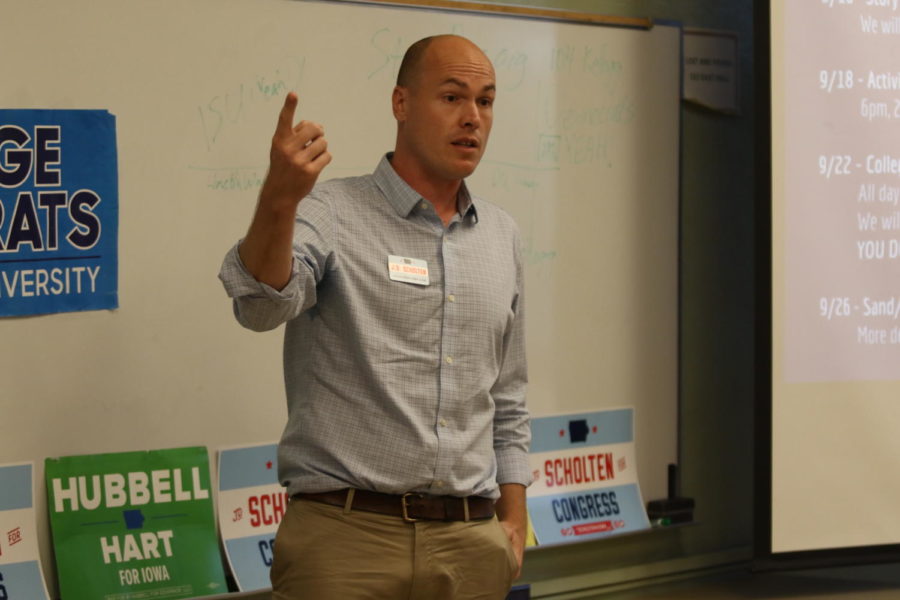- App Content
- App Content / News
- News
- News / Nation
- News / Politics And Administration
- News / Politics And Administration / State
Meet the candidate: J.D. Scholten runs for congress
Chris Jorgensen/Iowa State Daily
Congressional candidate J.D. Scholten speaks to members of ISU College Democrats at their first meeting of the year on Tuesday. Scholten asked the group for their help in building name recognition for the campaign. Scholten is challenging Steve King for his spot in congress.
October 31, 2018
J.D. Scholten was born in Ames, Iowa, in 1980. He graduated from East High School, and went on to play baseball for Morningside College and Nebraska University, where he made academic all-conference.
After graduation he played minor league baseball in Europe, Washington and Iowa. In between seasons he worked as a paralegal in Seattle and Minneapolis, where he specialized in eDiscovery and intellectual property law.
He began his campaign in 2016 with one goal in mind: Beating Steve King. Since then he’s taking a pledge to take no corporate PAC money, and instead relies on small and large individual donations for more than 94 percent of his campaign finances, with the additonal money coming from Democratic party PAC contributors.
Student Loan Crisis
Scholten has often criticized the high costs of secondary education. He thinks cutting the funds to higher education financially cripples vast multitudes of students, and hurts Iowa’s economy as a consequence.
“Going to college shouldn’t mean you have to take on massive amounts of debt,” Scholten said. “You should make enough money with a summer job to pay tuition at a public university.”
However, Scholten isn’t a proponent of totally free college tuition. He thinks universities should come at a price, but right now that price is costing students too much.
“I would support free community college,” Scholten said. “The way we make four-year colleges accessible is by lowering the costs and raising the minimum wage.”
Scholten said he would also support loan forgiveness programs. He sees that as a way of strengthening Iowa’s workforce, and incentivizing students to stay in Iowa and contribute to the state’s economy after graduation
“If you go on to live some of your professional life in the state you got an education, you should get some kind of reward for that,” Scholten said.
Healthcare
One of Scholten’s chief concerns is health care. This year Iowans have seen the cost of Medicaid nearly triple under Gov. Kim Reynolds privatization policies. Scholten says this step has only made things worse for Iowans, and the healthcare system needs total reformation.
“The cost of healthcare has gone up while accessibility has gone down,” Scholten said. “The privatization of Medicaid has been a disaster. It’s going to keep getting worse if we continue to elect the same people to represent us at home and in D.C.”
Much like Vermont Sen. Bernie Sanders, who toured around Iowa with Scholten earlier this month, Scholten believes the U.S. should move towards a Medicare for all system. However, he said that gravitating towards this system would be a process.
“The long term solution is Medicare for all,” Scholten said. “In the short term, I would immediately push for a public option to stabilize the marketplace, and I would reduce prescription drug costs.”
Scholten personally experienced the anxiety of being uninsured between his paralegal work and baseball career. He said affordable healthcare is a big piece to the puzzle when it comes to making Iowa’s economy work for everyone.
“Sometimes my health insurance was praying at night,” Scholten said. “Students are already in debt, combine that with the rising cost of Medicaid and growing housing prices, it looks like we’re heading in the wrong direction.”
Representing the Constituency
Scholten’s campaign has raised more than $1.6 million in individual donations, more than double King’s $736,629. He accepted no corporate PAC money, and said campaign finance reform and regular dialogues with citizens are important steps in making sure elected officials represent their constituents.
“King barely hosted town halls, and because of that we didn’t get to hold him accountable,” Scholten said. “The further that distance is, the more representatives can get away with, and things will only get more corrupt.
Scholten has toured all 99 of Iowa’s counties, twice. He returned last week from a different tour of the 39 counties in the fourth congressional district. If elected, he doesn’t plan to stop, and wants to talk with his constituents enough to effectively represent their interests.
“I pledge to do a town hall in each county every year I’m in office,” Scholten said. “People won’t always agree with each other, and that’s okay, but I will show up and fight for these people.”
Iowa’s Economy in Trump’s America
Scholten is critical of President Donald Trump’s trade deals abroad, and says these international policies are hurting Iowa farmers and other workers. He has said similar things about large corporate mergers, like Bayer-Monsanto, and that they dig into the profits of Iowa farmers.
“These market consolidations with agricultural corporations are cutting down farmers’ revenues,” Scholten said. “Less and less of the profits are going back to the farmer.”
Scholten also wants to expand Iowa’s economy into the technology industry. He remembered being in Seattle and meeting fellow Iowans, Iowans who studied at Iowa universities, but left home to find work out west.
“Last year Iowa State graduated 1,400 students who could’ve been employed in the tech industry,” Scholten said. “Less than 250 of them are working in Iowa. We need more of those people to stay.”
Corrections: The print version of this article read that ALL of J.D. Scholten’s campaign contributions were small donations. However, most were a mix of large and small donations, and around 6 percent came from Democratic Party PAC donors.
The original version failed to offer data for some of the Medicaid information, which has now been linked in the online article as of Nov. 4 at 7:10 p.m.
















